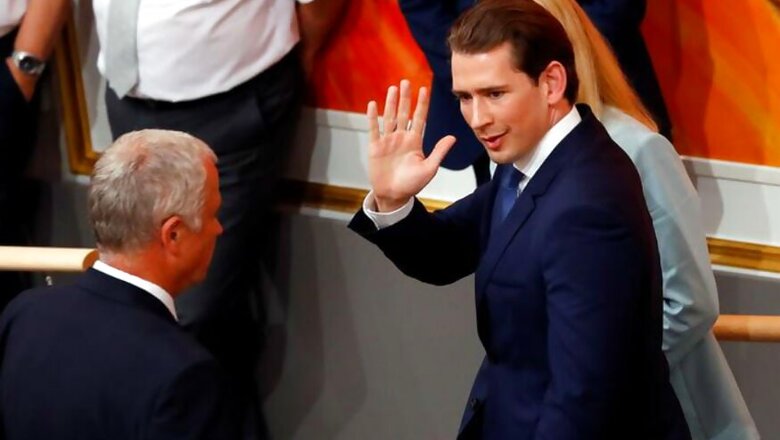
views
Vienna: The leader of Austria's conservatives Sebastian Kurz was sworn in on Tuesday as the world's youngest democratically elected leader, at the head of an unlikely coalition with the Greens following the collapse of his previous alliance with the far-right.
Vowing to "protect the climate and the borders", the 33-year-old has become chancellor of the Alpine country's first government to include the Greens, an arrangement called "exotic" and "unlikely" by Austrian media.
Speaking at a handover ceremony with his predecessor Brigitte Bierlein, Kurz said it was "good to be able to continue working for Austria" and promised, "We will strive every day to give our best."
Kurz's People's Party (OeVP) and the Greens agreed last week to govern together after the last administration with the far-right fell apart in a corruption scandal. Both the OeVP and the ecologist party made key gains in September's snap polls.
President Alexander Van der Bellen reminded the new government that "citizens have great expectations of you", adding "trust must be rebuilt".
The new government aims to please both parties by pushing for Austria to be carbon neutral by 2040 and also continuing previous strict anti-immigration measures.
Some observers think that if successful, the alliance could become a model for other European countries as nations across the continent grapple with populist sentiments but also climate change.
'Best of both worlds'
Kurz -- whose conservative OeVP has been in government for more than three decades -- has defended the undertaking as combining "the best of both worlds".
The OeVP has 10 ministers in the new coalition, while the Greens have four with its party chief Werner Kogler, 58, taking on the vice-chancellorship.
Among the ministers being sworn in on Tuesday, more than half are women, including the defence minister. Many are in their 30s and 40s.
A Green politician and former activist will front an enlarged environment ministry, which includes traffic, energy and technology as well.
The Greens have also nominated an openly lesbian party veteran to hold the culture portfolio, while a Green legal expert of Bosnian origin, who arrived in Austria as a child refugee, will head the justice ministry.
No 'love marriage'
But for all that's new, it's not a "love marriage", according to analyst Johannes Huber.
"As he (Kurz) says at every opportunity, they are very different parties", which have always been rivals rather than allies on a national level until now, Huber said.
And their detractors are many, including some in their own ranks.
The Far-right Freedom Party (FPOe) -- the third strongest party in parliament after the OeVP and the Social Democrats (SPOe) -- was quick to denounce Kurz's "swing to the left" and the "dangerous experiment" out of which "nothing good" can come for the country of 8.8 million people.
The SPOe too criticised the new government's programme, saying social questions hadn't been addressed well enough.
Kurz first became the world's youngest chancellor in a government with the FPOe from December 2017 until May last year, driving a hard line against immigration and brushing off a steady stream of racist and anti-Semitic incidents involving his far-right colleagues.
But then the FPOe leader and vice-chancellor became engulfed in a graft scandal, leading to the collapse of the coalition and snap elections.
Disappointed FPOe supporters dealt the party a setback in the polls, many shifting their votes to the OeVP which won 37.5 percent -- an increase of almost six points from 2017.
The Greens, who failed to get into parliament in a shock result in 2017, garnered 13.8 percent as climate change replaced immigration as a top voter concern.
Party officials have said they have had to make "painful" compromises to reach the agreement with the powerful conservatives.
"The Greens are very pragmatic... It is important for the party to take on responsibility on a national level," Huber said.
Kurz has promised Austrians a stable government for the next five years.
However, "the new coalition has not provided a complete answer on how they plan to finance their fiscal plans," according to analyst Katharina Koenz of Oxford Economics.













Comments
0 comment